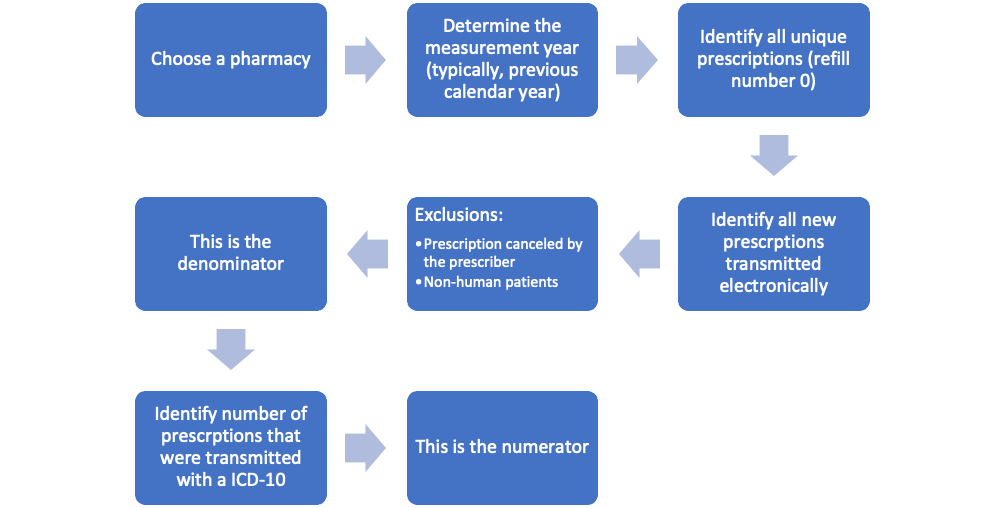Medication Indication
|
Title |
Medication Indication |
|
Description |
Percent of electronic prescriptions with prescriber-reported indication based on International Classification of Disease – 10
This is a reporting measure only |
|
Rationale |
Pharmacies ensure the right patient gets the right drug at the right time for the right reason. This measure will help to evaluate the right reason.
Caveats: This measure is not for performance evaluation. Pharmacists may not diagnosis patients (by entering patient-reported diagnosis in the pharmacy system). This measure will evolve over time to ensure every prescription has an indication and said indication is correct. |
|
Logic Model |
This measure is establishing the need pharmacies have for an indication on every prescription. Currently, regulatory barriers exist that prevents the measure from being ‘Every Medication Has an Indication’ however, this measure is headed in that direction. |
|
Level of Analysis |
Pharmacy (Prescription) |
|
Data Source |
Pharmacy Data |
|
Denominator Statement |
All prescriptions electronically submitted to the pharmacy during a measurement year |
|
Denominator Calculation |
1. 1. Identify all prescriptions in a pharmacy 2. 2. Identify all new prescriptions denoted as refill number 0 3. 3. Identify all new prescriptions with source field (NCPDP = electronic) 4. 4. Apply exclusion criteria |
|
Denominator Exclusions |
Any electronic prescription that was canceled by the prescriber. Any non-human patients (e.g., cats, dogs, clinics, office-use, etc) |
|
Denominator Exclusion Rationale |
Canceled prescriptions were never filled and confirmed to not be valid prescriptions Pharmacies may provide care to pets or other veterinarian needs, or for office-use. This patient profiles should be excluded from the measure calculation. |
|
Numerator Statement |
Percent of electronic prescriptions with prescriber reported ICD-10 |
|
Numerator Calculation |
1. Number of prescriptions with supplied ICD-10 |
|
Seguridad Measure Specification Process |
|
|
Data Stratification |
The measure rate will be reported as pharmacy.
If available and feasible, measure rate will be reported by type of pharmacy (e.g., health-system, community, specialty, mail-order, long-term care).
If available and feasible, measure rate will be reported by line of business (pharmacy Medicare rate, pharmacy Medicaid rate, pharmacy Commercial rate, and pharmacy uninsured rate).
Risk adjustment will be applied when available. |
|
Value Sets |
No value set is required for the calculation of this measure. |
|
Future Iterations |
Many pharmacy measures are designed as structure or process. Future goals of this concept include measures focused ensuring all prescriptions have an indication and that the indication and medication are appropriate. |
|
Harmonization1 |
Payors: N/A Providers: This measure is similar to the CMS SNF measure ensuring all medications have an indication. |
1. Measures that have either the same target populations (denominator) or the same measure focus (numerators) may be considered related, whereas measures that have the same targeted population (denominator) and same measure focus (numerator), are considered competing measures. Measures being developed should be harmonized, where feasible, to previously established measures to decrease measure burden. Choose My Pharmacy measures are developed for pharmacy evaluation, which is a novel area for measurement science, no current measure evaluates this level of analysis. Choose My Pharmacy measures will be harmonized to the extent possible, recognizing different levels of analysis have different data elements, and instead the focus will be to vertically integrate the Choose My Pharmacy measures with other measurement systems and measures.

